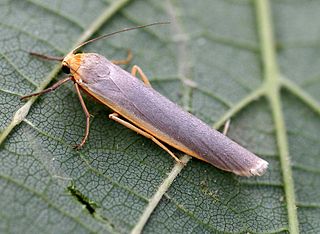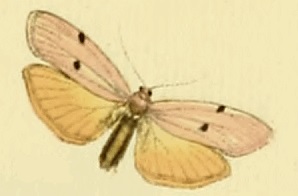Capissa is a monotypic tiger moth genus in the family Erebidae. It was previously treated as a synonym of Eilema. Its only species, Capissa vagesa, is found in the north-western Himalayas, Kashmir, Nepal and Upper Myanmar. Both the genus and species were first described by Frederic Moore; the genus in 1878 and the species in 1860.

Eilema is a genus of moths in the subfamily Arctiinae. The genus was erected by Jacob Hübner in 1819.

Manulea complana, the scarce footman, is a moth of the family Erebidae. The species was first described by Carl Linnaeus in his 1758 10th edition of Systema Naturae. It is found throughout the Palearctic region.

Katha depressa, the buff footman, is a moth of the family Erebidae found in Asia and Europe. It was first described by Eugenius Johann Christoph Esper in 1787.

Wittia sororcula, the orange footman, is a moth of the family Erebidae. The species was first described by Johann Siegfried Hufnagel in 1766. It is found in Europe, Anatolia and further east across the Palearctic to southern Siberia and the Amur basin to China.

Eilema caniola, the hoary footman, is a moth of the family Erebidae. The species was first described by Jacob Hübner in 1808.

Eilema lutarella is a species of moth in the family Erebidae. It is found in North Africa through Central Europe up to the area surrounding the Amur River and Sakhalin. In the north, it is found up to Scandinavia, Komi Republic in European Russia, Vitim river in Siberia.
Manulea pseudocomplana is a moth of the family Erebidae. It is found from central and southern Europe to Ukraine, Turkey and Iran.
Eupithecia muscula is a moth in the family Geometridae. It is found in Mexico.
Muscula is a genus of moths in the family Erebidae.
Dolgoma cribrata is a moth of the family Erebidae first described by Otto Staudinger in 1887. It is found in eastern Asia, more specifically Russia, China, Korea and Japan.

Zobida bipuncta is a moth of the subfamily Arctiinae. It is found in Larache, Morocco and the southern part of the Iberian Peninsula.
Manulea costalis is a moth of the family Erebidae. It is found in Albania, Bulgaria, Serbia, North Macedonia, Greece and on Crete, as well as in Turkey and Armenia. on the Andamans and from India to Myanmar.
Manulea minor is a moth of the family Erebidae. It is found in the Russian Far East and Japan.
Muscula brevifurca is a moth of the family Erebidae. It is found in Iraq.
Prabhasa venosa is a moth of the family Erebidae. It is found in eastern India, Myanmar, Thailand, China and Taiwan.
Tarika is a monotypic moth genus of the subfamily Arctiinae in the family Erebidae. Its only species, Tarika varana, is found in Sikkim, India. The genus and species were both first described by Frederic Moore; the genus in 1878 and the species in 1866.
Eilema albidula is a moth of the subfamily Arctiinae first described by Francis Walker in 1864. It is found in the Democratic Republic of the Congo, Nigeria and Sierra Leone.
Eilema plana, the little white lichen moth, is a moth of the subfamily Arctiinae. The species was first described by Jean Baptiste Boisduval in 1832. It is found in the Australian states of Queensland, New South Wales and Victoria.

The Lithosiina are a subtribe of lichen moths in the family Erebidae. The taxon was erected by Gustaf Johan Billberg in 1820.







